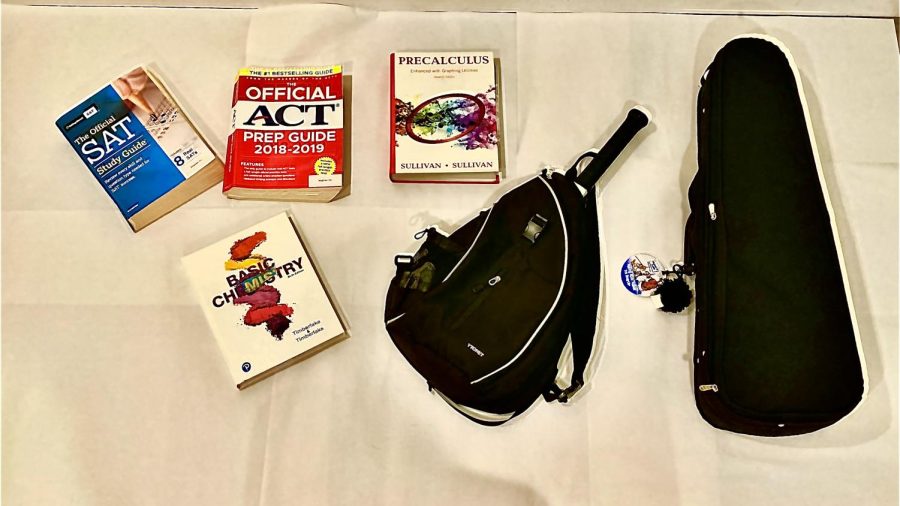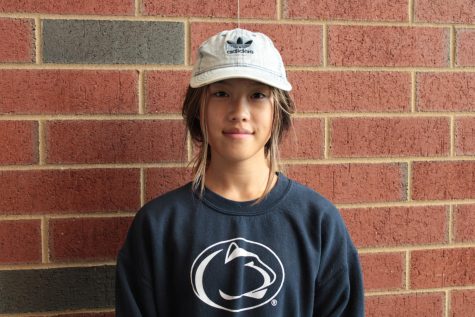Student Athletes: The Academic Pressure versus the Athletic Positivity
This is just a fraction of all the materials a student athlete needs to carry out their regular school week.
December 5, 2022
Since its beginning, State College Area High School has accumulated almost 30 sports teams. This means 30 different communities of people supporting each other and hundreds of students working together to win games and represent State High.
This also means hundreds of students having to balance their academic workload with their athletics. While being on a sports team students have opportunity to become more integrated with the school community, it takes up a lot of time.
SCASD itself is known for being a school district with excellent and diverse opportunities, including but not limited to its music programs, learning enrichment programs, and (specific to State High) its seventy-plus electives. However, with an expansive selection of opportunities comes heavy expectations.
Apart from State High’s rigorous workload, its athletic expectations are just as heavy in comparison. Many sports teams require conditioning and group workouts, as well as an extra condition of maintaining passing grades— placing even more emphasis on the importance of academic quality among SCAHS’s student athletes.
Rebecca Donaghue is the head coach for State High’s girls’ cross country team. Although school comes first, this does not mean that she does not have high expectations for the performance of her team.
“We, myself and my coaching staff, expect the team to pursue both personal and team excellence in the sport. […] We also make sure everyone knows that all members of the team, from our first runner to our last, play an important role in the team’s success. This, coupled with the goals, really helps with accountability,” says Donaghue.
Practices and games will take a minimum of two hours a day for most players – in turn reducing the time they can spend working on their schoolwork. When taking away games into consideration, the difficulties of balancing sports with school grow more and more.
Senior Quiana Guo, who has been playing on State College Girls’ tennis team for four years, has experienced many of these difficulties firsthand.
“I took Chemistry 2 last year, and it was last block. Going to practices – well, matches specifically – meant that I had to leave early and miss a lot of class. Practice would also sometimes hinder my time to do homework and learn,” Guo said.
Maddie Titus has been a counselor at State High for just over 4 years. She has witnessed many cases where students have started to go over their heads trying to maintain their sports team and school.
“I have seen a lot of students struggle to balance their course load while playing a competitive sport during high school. Especially when the sport requires a lot of travel to games/competitions and then they have to make up the work missed in class either after the game/competition or the next day to not fall behind. Sometimes because of the added stress to make up missed work due to the intensity of high school sports, I have seen students question if they should quit the sport all together,” Titus explained.
However, students shouldn’t be underestimated. When you take into account all the resources that the school has to offer, there are plenty of chances for students to get help from their community and advocate for themselves in the face of problems.
“My chem class was a great resource last year with stuff I miss[ed], so talking to friends in your class can really help,” Guo noted.
Coaches are also an important support system that students can rely on. “I always remind [my players] that school comes first. Maintaining a healthy balance between academics and athletics can be a tricky thing to do. If someone is struggling to maintain that balance, we will try and figure out a personalized plan – which might involve cutting back on the training load, sitting out from practices to spend more time with academics, or reaccessing lifestyle goals. Ultimately, we want what’s best for the student-athletes and will work with the individual situation at hand,” Donaghue said.
“In rare cases, some [students] have dropped their sport, but more often than not, they are able to prioritize and manage both academics and athletics after working with their coach and teachers,” Titus said.
Despite all the struggles, athletes collectively believe that the positive experiences of being a part of a sports team heavily outweigh the difficulties. Being on a team can help students with team working skills, it can boost self-esteem, and most importantly, sports can connect students to peers and build friendships.
“[Tennis] is where I’ve found a family for the past four years, and it’s been really fun. You get to know [other people] really well and you make a lot of friends,” Guo said.
All things considered, there truly are wonderful aspects to sports teams, and being a part of one can definitely brighten your high school experience. However, this doesn’t take away from the clear challenges that one would face, from expectations of the sport itself and the conflicts it might have with academics.


